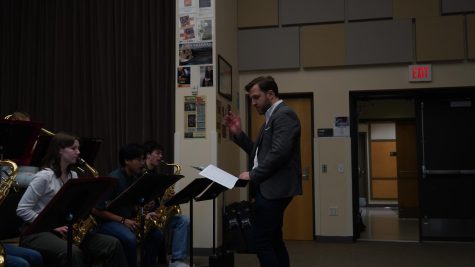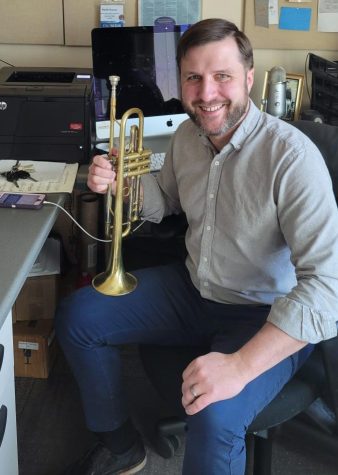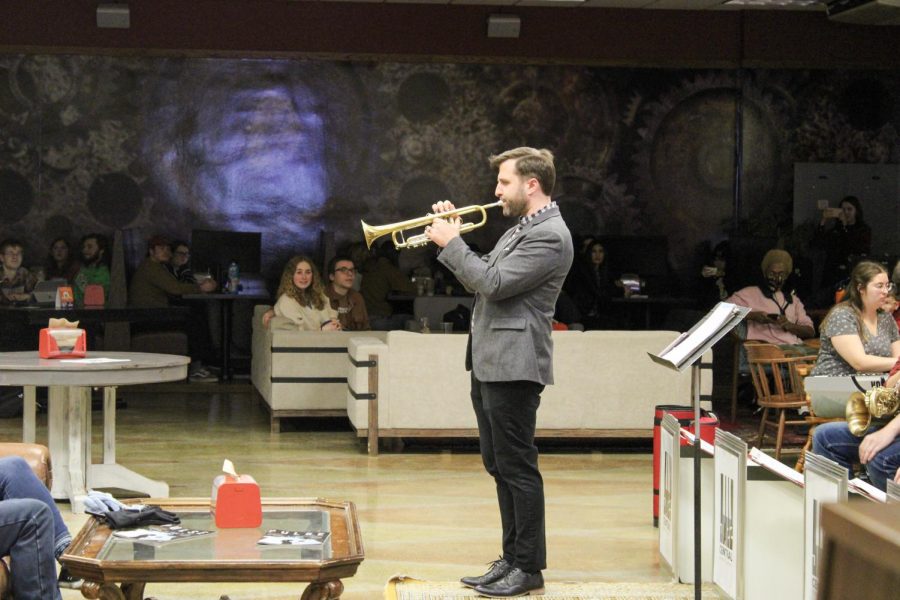Continuing a legacy at CWU: Keith Karns, the new director of jazz
April 5, 2023
From a lifestyle of traveling and playing jazz all hours of the day and night, to igniting a passion for jazz in CWU students full-time, Keith Karns is finishing out his first year as the new director of jazz. Originally a trumpeter, Karns gained experience performing and teaching to prepare him for the legacy he will continue at CWU.
Karns talked about how growing up, everyone in his family was musical to some degree; his mother and sister played piano and his father played trumpet and guitar, but they didn’t make music their career.

“When I decided I was going to be a professional musician, I don’t know how successful they thought I was going to be in that, but they were supportive, and I was very lucky to have that support,” Karns said. “That’s what enabled me to be a professional.”
In high school, Karns said band was something fun to do, but in college, he started to view performing as a job.
“Everything about playing music, everything that trumpet was, was work and I had to be serious about that in the same way that a lawyer would be serious about their job,” Karns said.
One of his favorite performances as a trumpeter was when he became a finalist at the National Trumpet Competition. This year, a few of CWU’s students made it to the semi-finals of that same competition.
In his career, he played alongside big names in jazz, but he also has fond memories of playing in a small cafe when he lived in Texas.
“I played in just kind of a pickup big band on Thursday nights for many years,” Karns said. “We played from 11 p.m. – 3 a.m. in the morning, and I think everyone in the band made $15, and those are still some of my best musical memories.”
When asked about his driving factor to not give up on music, Karns said that he is just really stubborn.
“I think in this business, you just have to be,” Karns said. “Practicing was never a hard part for me because I was committed to getting better.”
In his 20s, before his son was born, Karns propelled himself into the musician lifestyle in Texas where he was living.
“I was teaching at two different community colleges, I had to do all my teaching Monday and Tuesday, and then on Wednesday, I’d have a gig in Dallas, Friday, a gig in Houston, Saturday, a gig in Austin,” he said.
He also played church services and taught private trumpet lessons, and performed around the country, including in Michigan, Kansas City and New Orleans.
Karns has accepted awards from JEN (Jazz Education Network) and others, but he said that he focuses less on the awards he wins and more on the quality of his work.
“If I get recognized for [my work], I’m thankful, but, I’m mostly focused on the task at hand here, and that is working with students at [CWU],” Karns said.
His favorite performance with CWU so far was the Duke Ellington Nutcracker Suite performed by the Jazz I ensemble in Dec. 2022.
“We did that show at The Seasons Performance Hall in Yakima, and that’s something of a tradition here,” Karns said.“I think I just want to continue the tradition of excellence we have here,” he said. “The longer I’m here, the more I realize how kind of legendary this music program is in the area, stretching back decades.”
The fun has only begun as Karns gears up for a spring quarter full of events, including Women in Jazz Day on April 22, at which a few nationally-known performers and educators will be playing music with CWU students. Then, that same day, Jazz I is going to North Bend, Washington for the North Bend jazz walk where they will headline at Boxley’s Jazz Club. On May 5 and 6, the annual John Moawad jazz festival will take place in McIntyre Hall.

The historical legacy of jazz at CWU
Professor Vijay Singh teaches vocal jazz and helps direct the jazz combos at CWU. He described the history that CWU created in jazz.
Jazz music, in the 30s and 40s, was the pop music of the time. So, it didn’t have much validity in academic settings, where classical music took precedence.
“Back in 1947, a number of students actually convinced one of the faculty at [CWU] at that time to actually create a jazz instrumental ensemble so that they could play the music that they listened to,” Singh said.
The faculty member worked to make the jazz ensemble into a class for credit and over the years, other universities followed suit. People started realizing that it had real academic validity and cultural significance.
“All the other types of music, for the most part, had come from other parts of the world. Jazz is truly an American art form,” Singh said.
It was around the same time that North Texas University, where Karns studied, began also introducing jazz education.
Those two programs, CWU and North Texas, are monumentally part of the foundation of what we consider jazz education now in academia, according to Singh.
“It’s a pretty cool legacy for our students to know,” Singh said. “This is one of the places where jazz education actually was first being taught and accepted, and now, you can go to any university across the country and almost all of them have some kind of jazz program.”
John Moawad was one of the directors who got CWU recognized when he directed jazz and percussion. In the mid ’90s, he retired and the music department dispersed his responsibilities in jazz to two people: Singh, who came on as the director of vocal jazz, and Chris Bruya, who came on in the early 2000s and directed the jazz bands. Together, these two built upon that legacy for about 20 years, until Bruya retired in 2021.
Singh and Karns co-teach the jazz combos now, and Karns also directs all three jazz bands.
“He’s a very good musician, a fine trumpet player and arranger,” Singh said of Karns. “He might not have the same level of experience that some of us have as far as teaching for a broader length of time, but he’s got all the skills to succeed down the road.”
“Following a legend like John Moawad is not easy, following a legend like Professor Bruya is not easy,” Singh said. “So, he’s going to have to make that transition like a lot of us have done, and usually that means that you honor the past of what came before you, and then try to add your own thing and take things in the direction that you want and contribute to the legacy.”
One of CWU’s music professors who teaches trumpet and jazz, John Harbaugh, met Karns when they were both living in Alaska. Harbaugh gave trumpet lessons to Karns when he was in high school, and he remarked that Karns was always a go-getter.
Now that Karns is on CWU’s team of music educators, Harbaugh believes that he is putting in the work to uphold CWU’s standards.
“I think the program is in good hands, I think he’s got all the bases covered,” Harbaugh said. “He has great experience as an educator, he’s a player and also a writer, and that’s a mixture of what new jazz faculty have to have. ”


